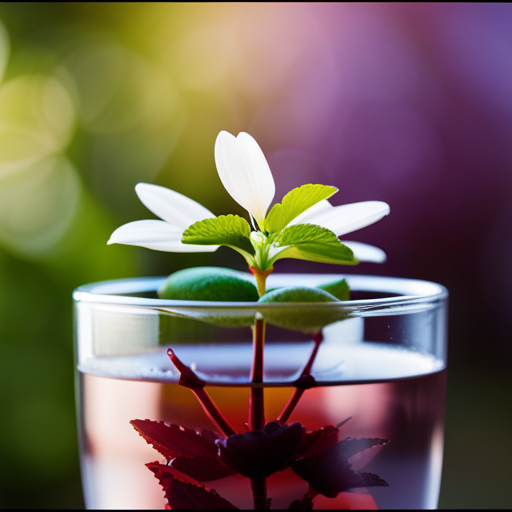Are your plants looking a little lackluster lately? Maybe it’s time to switch up their watering routine. Have you considered using reverse osmosis (RO) water?
This type of water has become increasingly popular among plant enthusiasts due to its purifying filtration process. But before you make the switch, it’s important to understand the pros and cons of using RO water for your green friends.
In this article, we’ll take a closer look at the different types of water for plants and explore the benefits and drawbacks of using RO water. We’ll also provide some helpful tips for using RO water to revitalize your plants.
Whether you’re a seasoned gardener or a newbie plant parent, we’ve got you covered. So grab a glass of water and let’s dive into the world of RO water for plants.
Key Takeaways
– Reverse osmosis water is best for delicate plants like violets and orchids as it removes harmful contaminants and prevents problems caused by dissolved minerals.
– However, RO water removes essential minerals that plants need to grow and is more acidic than neutral, which can be harmful to plants.
– RO water is purified through filtration using a pre-filter, semipermeable membrane, and post-filter, but it is expensive and requires regular maintenance.
– Fertilizer is necessary to add back essential minerals when using RO water for plants, and well water and spring water contain beneficial minerals for plant growth.
Types of Water for Plants
If you want to revitalize your plants, you should know the different types of water available and their benefits.
Rainwater collection is a natural and free way to water your plants, but it can be difficult to collect.
Tap water treatment usually involves the addition of chlorine or chloramine, which can be harmful to some plants.
Distilled water removes all contaminants and beneficial minerals, while spring water is naturally filtered and contains beneficial minerals but can be expensive.
Softened water is okay for some plants but high in sodium, while well water needs to be tested first.
Aquarium water can be beneficial for some plants, while reverse osmosis (RO) water is purified through filtration and is a great choice for watering plants.
Benefits and Drawbacks of RO Water
You can enjoy the benefits of using reverse osmosis (RO) water for your plants, but it’s important to be aware of some potential drawbacks as well.
One of the biggest pros of using RO water for plants is that it removes harmful contaminants, providing clean water free of impurities that could harm delicate plants like violets and orchids. Additionally, using RO water can prevent problems caused by dissolved minerals, which can build up in soil over time and lead to issues like root rot.
However, it’s important to note that RO water removes essential minerals that plants need to grow. Without these minerals, plants may not grow as quickly or robustly as they would with other types of water. Additionally, RO water is more acidic than neutral, which can be harmful to some plants.
To combat these drawbacks, it’s recommended to add fertilizer to RO water to provide the necessary minerals for plant growth. Overall, the pros and cons of using reverse osmosis water for plants should be considered before making a decision, as the effect of RO water on plant growth can vary depending on the specific needs of the plant.
Tips for Using RO Water for Plants
To ensure optimal plant growth, consider adding fertilizer to your purified reverse osmosis water. While RO water is purified through filtration, it lacks essential minerals that plants need to grow. Adding fertilizer can help replenish these minerals and ensure that your plants thrive.
Here are three tips for using RO water for plants:
1. Use RO water fertilizer to add essential minerals back into the water.
2. RO water is a great option for sensitive plants, such as orchids, that are sensitive to impurities in tap water.
3. Remember that RO water is devoid of all minerals, so it’s essential to add fertilizer to promote plant growth.
Conclusion
In conclusion, using reverse osmosis water for your plants has its pros and cons. While it may provide a purified source of water that’s free of harmful contaminants, it also strips away essential minerals that your plants need to grow.
If you decide to use RO water, it’s important to supplement your plants with these minerals through fertilizers or soil amendments. Additionally, it’s worth considering the cost and environmental impact of using RO filtration systems.
Ultimately, the type of water you use for your plants will depend on your specific needs and preferences. Whether you opt for tap water, well water, or RO water, it’s important to monitor your plants’ growth and adjust your watering routine accordingly.
With proper care and attention, your plants will thrive regardless of the type of water you use.
